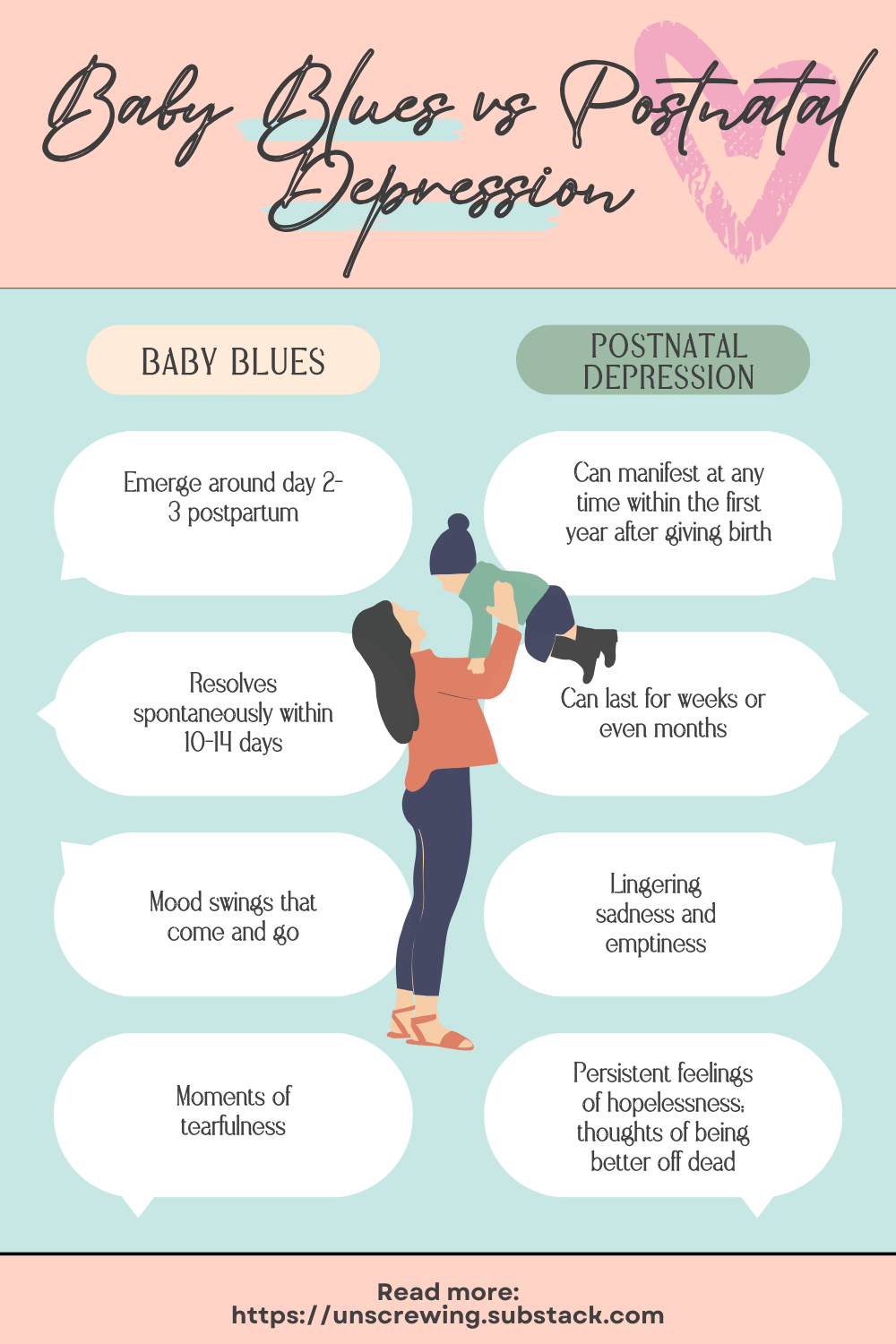Navigating the New Mum Rollercoaster: Baby Blues vs. Postnatal Depression
Learn to distinguish between baby blues and postnatal depression, while discovering powerful CBT and CFT tools from an experienced therapist.
Hi Wonder Woman,
In my practice, I often encounter a common misconception among new mothers about the distinctions between baby blues and postnatal depression. Some are anxious about experiencing postnatal depression just a few days after childbirth, while others start therapy six months postpartum, feeling their baby blues haven't subsided. Let's shed light on these experiences.
Baby Blues - A Rollercoaster Ride You Didn't Sign Up For but Got a Ticket To Anyway
Baby blues are a prevalent experience characterized by mood swings and occasional tearfulness. Emerging around day 2-3 postpartum, it's linked to hormonal shifts, mainly in progesterone, and the transitional arrival of milk. Baby blues may evoke feelings of tearfulness, anxiety, and temporary detachment from the baby. Fortunately, it's a transient state that typically resolves within 10-14 days.
Postnatal Depression – When the Rollercoaster Ride Overstays Its Welcome
In contrast, postnatal depression is a more persistent and serious condition, involving enduring feelings of sadness, hopelessness, and changes in sleep and appetite that extend beyond the initial postpartum period. It can manifest at any time within the first year after giving birth and may impact the bonding between mother and baby.
How to Tell the Difference?
Apart from the duration of symptoms, another way to differentiate is the intensity and persistence of emotions. Baby blues feelings are intense but fleeting, while postnatal depression lingers, with emotions strongly felt in your body. Critical thoughts like "I am a bad mother" or "I do not deserve this beautiful baby" often accompany it.
Signs it might be Baby Blues:
Moments of tearfulness
Mood swings that come and go
Feeling overwhelmed but not persistently
Signs it might be Postnatal Depression:
Lingering sadness or emptiness
Persistent feelings of hopelessness
Changes in sleep – inability to sleep despite exhaustion or excessive sleeping
Changes in appetite – overeating or undereating
Thoughts of being better off dead or hurting yourself
8 CBT and CFT Tools to Manage Postnatal Depression
Remember, while these suggestions offer valuable support, seeking professional help is crucial in managing postnatal depression.
1. Cognitive Restructuring (Reframing Unhelpful Thoughts): Cognitive restructuring involves identifying and challenging negative thoughts. For instance, if you find yourself thinking, "I'm not a good enough mom," take a moment to pause. Ask yourself for evidence supporting or refuting this thought. Reframe it with a more balanced perspective, acknowledging your efforts and successes. You might jot down positive moments in a daily journal to counteract self-critical thoughts.
2. Mindful Moments: Incorporate mindfulness practices into daily activities. During moments like holding the baby, walking with the pram, or simply breathing, focus on being fully present. Pay attention to sensations, sounds, and the environment. Practising mindful breathing for a few minutes each day can serve as an anchor to the present moment, fostering a sense of calm amidst the chaos.
3. Self-Compassion Practices: Cultivate self-compassion by treating yourself with kindness. When facing challenges, acknowledge your feelings without judgment. Instead of harsh self-criticism, validate your emotions. For example, if you're feeling overwhelmed, offer yourself understanding by saying, "It's okay to feel this way. Many new moms experience similar struggles." Imagine what comforting words you would say to a friend going through a tough time.
4. Behavioural Activation: Engage in purposeful activities to enhance mood and well-being. Create a simple daily schedule that includes enjoyable activities. Start with small accomplishments like making a cup of tea, putting on fresh clothes, or taking a short walk. Gradually increase the complexity of these activities. This could involve setting a goal to read a chapter of a book or spending quality time with your baby each day.
5. Gratitude Journaling: Focus on positive or less challenging aspects of each day. If the term "positive" feels too strong, think about things that made the day "not so bad" or "not a complete catastrophe." Jot down three things you're grateful for or three things that went better than expected. This simple practice shifts your focus toward positive elements, fostering a more optimistic outlook.
6. Social Connection: Seek support from friends, family, or support groups. If finding understanding within your immediate circle is challenging, consider reaching out to a GP or other professionals. Share your experiences with others who may be going through similar challenges. Connecting with people who empathize with your journey can alleviate feelings of isolation.
7. Thought Defusion: Learn to distance yourself from negative thoughts. Imagine negative thoughts as passing clouds, rather than absolute truths. Notice and name the thought without judgment. This process allows you to create mental space, reducing their impact on your emotions. For example, if a thought arises saying, "I'm failing as a mom," remind yourself that it's just a passing thought, not a definitive truth.
8. Values Clarification: Reconnect with personal values and align your actions with them. Identify what matters most to you as a parent, partner, and individual. For instance, if being present for your child is a core value, plan activities that align with this, like dedicated playtime. This process helps instil a sense of purpose and meaning, guiding your daily activities towards what truly matters to you.
Remember, you are not alone. Seek support, whether through therapy, support groups, or connecting with loved ones.
Wishing you strength and resilience,
Aleks x



